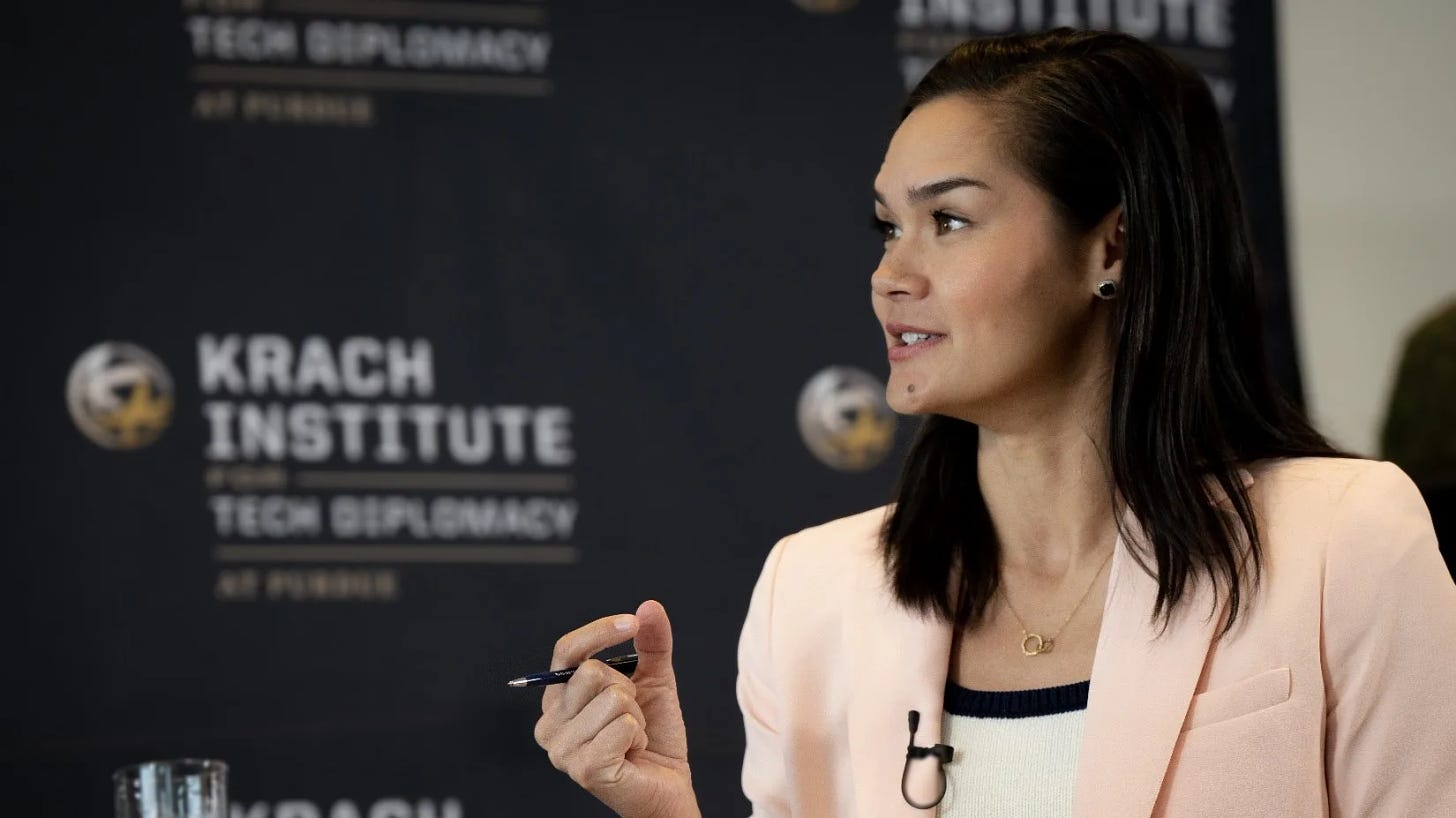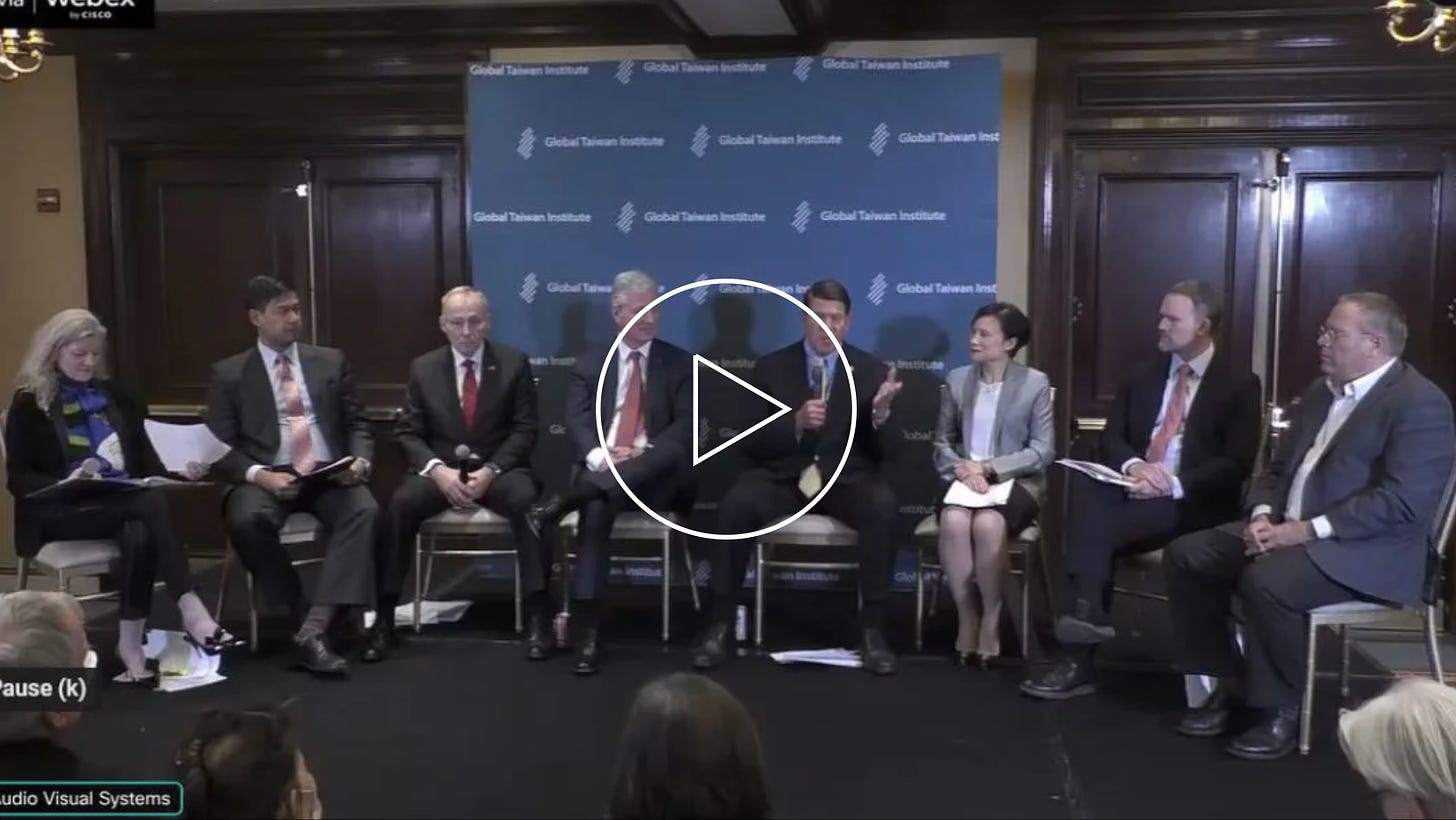Tech Diplomacy Now: First CHIPS Act Grant Announced
The Biden Administration announced the first grant under the CHIPS and Science Act to quadruple production capacity of semiconductors that go into the F-35 fighter jet program.
TABLE OF CONTENTS
Top News of the Week
Announcements
Latest News
Technology Strategy and Policy
Artificial Intelligence
Telecommunications Networks and Infrastructure
Critical Minerals
Synthetic Biology
Quantum
Advanced Aerospace Technology
Semiconductors and Microelectronics
Energy and Climate
Opinion and Commentary
The Last Word
Top News of the Week – First CHIPS Act Grant Announced
On Monday, the Biden Administration announced the first grant under the CHIPS and Science Act to quadruple production capacity of semiconductors that go into the F-35 fighter jet program. These mature-node chips are currently fabricated at a Department of Defense designated “Trusted Foundry” in New Hampshire.
The funding will BAE Systems to expand production and make the U.S. defense enterprise less dependent on mature-node chips produced in China.
More background:
Biden-Harris Administration and BAE Systems, Inc., Announce CHIPS Preliminary Terms to Support Critical U.S. National Security Project in Nashua, New Hampshire – NIST, December 11, 2023
Biden Administration Chooses Military Supplier for First Chips Act Grant – NYTs, December 11, 2023
Announcements

U.S. Senate Unanimously Confirms Michelle Giuda, Krach Institute CEO, as Member of Bipartisan Board to U.S. Agency for Global Media
The Krach Institute for Tech Diplomacy at Purdue, the world’s preeminent nonprofit trusted technology accelerator, announced today that its CEO, Michelle Giuda, has been unanimously confirmed by the U.S. Senate to serve on the newly formed bipartisan International Broadcasting Advisory Board (IBAB) of the U.S. Agency for Global Media (USAGM). The board will provide strategic counsel and oversight to the USAGM as it works to promote democratic values by providing accurate, uncensored news and open debate in countries where a free press is threatened, and where disinformation is pervasive.
“I am deeply honored to join the USAGM’s International Broadcasting Advisory Board,” said Giuda. “We stand at the precipice of a high-tech, high-stakes geopolitical era, and the role of media and the information space in our mission to advance freedom, democracy and the truth could not be more critical. As the media environment is reshaped by technology, this opportunity to serve the interests of the United States by ensuring technology serves, not silences, free speech and a free press aligns perfectly with the Krach Institute’s mission of advancing freedom through trusted technology. Authoritarian regimes cannot stand in the light of truth. I look forward to collaborating with my esteemed colleagues to make sure that light reaches everyone in the world.”
Read the full announcement HERE
Task Force Report Release: “Advancing the US-Taiwan Partnership in a Changing Global Landscape”
For decades, the US-Taiwan relationship has served as a cornerstone of the US policy approach to the Indo-Pacific. Despite substantial geopolitical headwinds, Washington and Taipei have been able to forge a strong and enduring partnership, based on shared values and interests. However, these ties have faced increasingly pressing challenges in recent years. The People’s Republic of China (PRC) has shown a growing willingness to upend the norms and greater stability of earlier decades by engaging in both overt military coercion and political warfare subversion directed at Taiwan.
Meanwhile, wars in Eastern Europe and the Middle East have significantly destabilized the international system, potentially paving the way for further authoritarian aggression. Amid these challenges, reinforcing and expanding the US-Taiwan partnership has become more critical than ever.
Read the full announcement HERE
Select Committee Adopts Proposal to Reset Economic Relationship with The People's Republic of China
The Krach Institute for Tech Diplomacy commends the House Select Committee on the CCP and its leaders, Chairman Mike Gallagher (R-WI) and Ranking Member Raja Krishnamoorthi (D-IL), for its bipartisan list of nearly 150 recommendations for addressing the competition between the U.S. and the Chinese Communist Party (CCP). These are critical tactics for the development of the Global Tech Security Strategy, led by the Krach Institute for Tech Diplomacy at Purdue, and for ensuring technology advances freedom. These complementary efforts aim to accelerate U.S. technological leadership, advance U.S. security within the homeland, promote secure supply chains for America and its allies, and prevent the CCP from being able to leverage predatory economic tactics to undermine U.S. economic and national security interests.
Latest News
JOINT FACT SHEET: Launching the U.S.-ROK Next Generation Critical and Emerging Technologies Dialogue – White House, December 8, 2023
Apple to move key iPad engineering resources to Vietnam – Nikkei Asia, December 8, 2023
Lawmakers Press Biden Administration for Tougher Curbs on China Tech – NYTs, December 7, 2023
Bureau of Industry and Security: 90 Day Review Report – House Foreign Affairs Committee, December 7, 2023
AUKUS Defense Ministers Meeting Joint Statement – U.S. Department of Defense, December 1, 2023
Technology Strategy and Policy
Key Congress staffers in AI debate are funded by tech giants like Google and Microsoft – Politico, December 3, 2023
Pentagon forges new high-tech agreement with Australia, United Kingdom, aimed at countering China – AP, December 1, 2023
Pentagon plans a drone army to counter China’s market dominance – WaPo, December 1, 2023
US to limit Chinese firms, battery parts from winning EV tax credits – Reuters, December 1, 2023
Artificial Intelligence
This A.I. Subculture’s Motto: Go, Go, Go – NYTs, December 10, 2023
E.U. Agrees on Landmark Artificial Intelligence Rules – NYTs, December 8, 2023
Microsoft's OpenAI Investment Risks Scrutiny from US, UK Regulators – Bloomberg, December 8, 2023
How China’s $70 AI copyright ruling impacts the world – Semafor, December 4, 2023
Telecommunications Networks and Infrastructure
5G/6G Technology and the Future of Global Security – CSIS, December 11, 2023
Huawei to start building first European factory in France next year – Reuters, December 11, 2023
China rejects spying concerns from Costa Rica leader over 5G network – Reuters, December 7, 2023
Apple Aims to Make a Quarter of the World’s iPhones in India – WSJ, December 6, 2023
French documentary reveals TikTok's attempts to influence Taiwan elections – Taiwan News, December 5, 2023
Critical Minerals
Will US-China Rivalry Spur the Transformation of Indonesia’s Critical Minerals Sector? – The Diplomat, December 11, 2023
North Dakota researchers find cost-effective way to extract rare-earth elements from coal – MPR News, December 8, 2023
Western start-ups seek to break China's grip on rare earths refining – Reuters, December 4, 2023
India launches first part of critical minerals auction worth $5.4 bln – Reuters, November 29, 2023
Synthetic Biology
Ultrasound Enables Remote 3-D Printing—Even in the Human Body – Scientific American, December 11, 2023
FDA Approves World’s First Crispr Gene-Editing Drug for Sickle-Cell Disease – WSJ, December 8, 2023
China biotech: investors fear a negative reaction from the US – Financial Times, December 5, 2023
Quantum
Study paves way for development of advanced quantum networks – Phys.org, December 12, 2023
IBM unveils world’s largest quantum chip – Freethink, December 11, 2023
‘Off to the races’: DARPA, Harvard breakthrough brings quantum computing years closer – Breaking Defense, December 7, 2023
Advanced Aerospace Technology
SpaceX postpones planned launch of US military's secretive X-37B spaceplane – Reuters, December 11, 2023
China launches internet technology test satellite from sea barge – Space News, December 6, 2023
Army has a revised hypersonic test plan to address launcher ‘problem’: Official – Breaking Defense, December 3, 2023
Semiconductors and Microelectronics
US Looking into Nvidia’s AI Chips for China, Raimondo Says – Bloomberg, December 11, 2023
Nvidia Sees Vietnam as Potential Second Home, Reports Say – Bloomberg, December 11, 2023
New York Joins IBM, Micron in $10 Billion Chip Research Complex – WSJ, December 11, 2023
Taiwan Deepens Squeeze on Chip Tech Leakage to China – MENAFN, December 9, 2023
TSMC, Labor Unions Reach Labor Accord for Phoenix Chip Site – Bloomberg, December 6, 2023
Energy and Climate
South Korean auto battery firms take on Chinese rivals but with trepidation – Reuters, December 12, 2023
Why Volkswagen Is Building a Team of 3,000 Engineers in China – NYTs, December 12, 2023
China says Biden plan to shut it out of US battery supply chain violates WTO rules – Reuters, December 7, 2023
Opinion and Commentary
How to China-Proof the Global Economy – Peter Harrell, Foreign Affairs, December 12, 2023
U.S. and China must seize opening to discuss military AI risks – Sam Bresnick, Nikkei Asia, December 12, 2023
Why the U.S. Needs a Moonshot Mentality for AI—Led by the Public Sector - Fei-Fei Li and John Etchemendy, WSJ, December 9, 2023
The American Way of Economic War – Paul Krugman, Foreign Affairs, December 6, 2023
The Last Word
“Trusted spectrum allocation is crucial for both national security & commercial interests.” - Chairman Keith Krach during the Center for Strategic and International Studies discussion on 5G/6G Technology and the Future of Global Security
About: Tech Diplomacy Now
The Krach Institute for Tech Diplomacy at Purdue is the world’s preeminent trusted technology accelerator. As the leader of the new category of Tech Diplomacy, the Institute integrates technology expertise, Silicon Valley strategies, and foreign policy tools to build the Global Trusted Tech Network of governments, companies, organizations and individuals to accelerate the innovation and adoption of trusted technology and ensure technology advances freedom.





